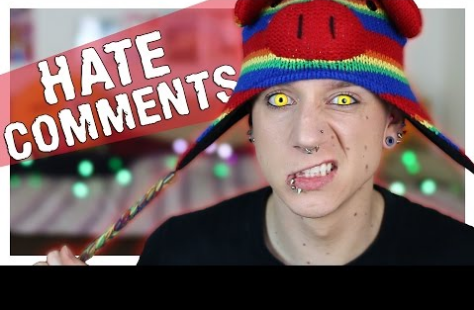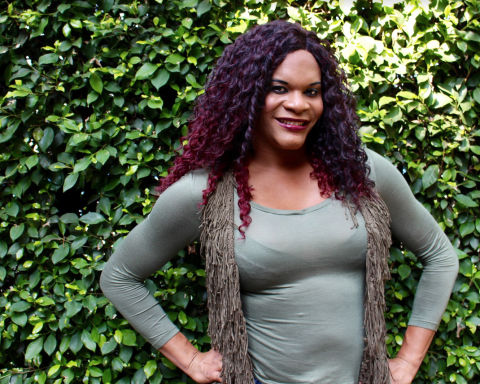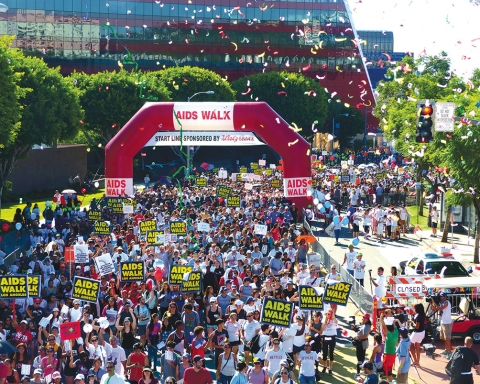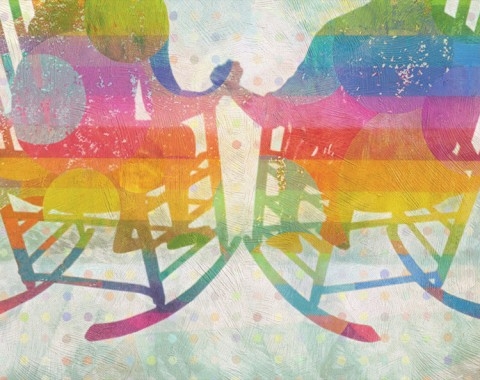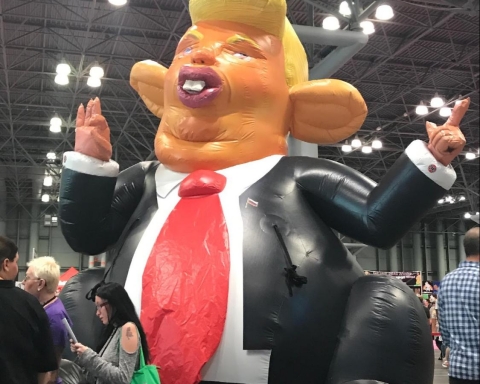
A London protester during a rally. Photograph by Peter Nicholls, via Reuters
Language is important. It is how we express thoughts and feelings, ask questions of ourselves and others, and for many, how we connect with our heritage and identity. There has even been some serious debate between theorists about how language affects the way you perceive the world.
Either way, “sticks and stones” is no longer the old adage it once was, and if we look at our current socio-political landscape, you can see evidence of how language has the power to heal or harm. Now more than ever, it is important that those of us with privilege hold space (and stand up!) for those of us who do not.
Even in our everyday usage, there are many phrases or terms that, while seemingly innocuous, can be silencing or harmful to our most vulnerable members of society. As we kick off a long four years, here are some everyday utterances to examine and reconsider in the spirit of creating space for others, being a good ally, and honestly, just making the world a better place. Read on.
. “…is my spirit animal!”
The culturally appropriative term “spirit animal” became popularized by the internet, of which The Atlantic does an examination of here. The Anishinaabe (but not all Native American tribes) have “spirit/dream helpers” as part of a very sacred tradition, and our idea of “spirit animals” today are a degraded form of these traditions formed through pretty racist understandings of stereotypes of Native American people.
Kerry Washington herself was called out on Twitter for using this term, and apologized, thanking her Twitter community for bringing it to her attention.
. “You guys…” or any other male-centered language
This one pops out of my mouth like clockwork, even when I don’t want it to. It is a particular brand of subtle, insidious sexism – and here’s why. Generally, it is socially acceptable for a group of women to be referred to by “you guys.” The reverse – a group of men referred to by “you gals” is offensive. (Though certainly, many people have reclaimed and/or queered this idea.) The basis for this is patriarchy. This phrase, along with many others, reinforces and perpetuates male dominant culture. Inherent in this idea is a patriarchal understanding that being female is lesser than.
Michael Jascz of Huffington Post does a pretty thorough examination of why not to use this phrase, and I’ll just quote him here: “Using ‘guys’ is part of a larger structure of exclusion that women face. […] It’s like death by 1000 cuts. As a female software engineer described her experience in the Tech industry, ‘even the tiniest little things add up to something big – sometimes it’s really death by 1000 paper cuts.’ ‘Guys’ is one tiny cut but sliced over and over again and combined with the axe of unnatural beauty ideals, the blade of the wage gap, and the guillotine of domestic violence. It is a paper cut that eventually turns into a scar.”
. While we’re at it, “him or her, he or she, boys and girls, ladies and gentlemen…”
via ItsPronouncedMetrosexual
Am I telling you never to say these words again? No. What I am suggesting is that it might be important to consider to whom you are saying these phrases. If you are with some people you know identify as men and women, sure! Fire away. If you’re addressing a larger audience where you don’t know how people identify, however, using language that represents gender as a binary can be much like “you guys” in that it reinforces and perpetuates heteronormative culture. For a list of nonbinary gender identities, look here.
. “Let’s have a pow-wow,” “off the reservation,” “Indian giver,” etc.

Eastern Shoshone Powwow, Fort Washakie. Photo by Jennie Hutchinson, via Wind River
In a return to linguistic oppression of Native peoples, these phrases either trivialize and casually disregard Native American traditions, or reinforces stereotypes of Native American people. NPR’s Kee Malesky wrote a thorough analysis of the phrase “off the reservation” which can be found here. And while we’re at it, Diversity Inc. has an article about other things to avoid saying re: Native American culture here.
To quote Rob Capriccioso of the Sault Tribe of Chippewa Indians and D.C. Bureau Chief for Indian Country Today, “It’s not about political correctness, either, it’s about helping the majority realize that there is a minority point-of-view that holds weight that the majority is giving too little credence. To me, there are indeed many more offensive words involving American Indians than this phrase — including the name of the Washington football team — but I believe it is the common use of phrases like ‘off the reservation’ that allows people to end up being comfortable going further — to the point of using a slur to name a football team that supposedly honors Indians, but not realizing that it is actually a slur.”
. Gypsy, and being “gypped”

via SpellDesign
First off, the word “gypsy” is an exonym that was put on the Roma people. Much like “Indians” to mean Native Americans, as Roma people moved from Northern India to Europe, they were mistaken as Egyptians, and the name stuck. The word “gypped” comes from the word “gypsy.” And since we’ve already addressed language and stereotypes, I don’t have to say more, right?
The word “gypsy” itself is considered by many to be a racial slur, though some Roma people self-identify as gypsies. But here’s the deal: unless this is your background, it is appropriative (and offensive) to be referring to yourself as a such. (Also offensive: naming your animal “Gypsy.”) Using “gypsy” to describe yourself as a bohemian, free-living person when you are not Roma is at worst a form of participation in cultural erasure – perverting an entire people’s history, experiences, and identities (much of which involves hundreds of years of surviving discrimination) and reducing it to a stereotype. At best, it is the linguistic equivalent of an appropriative costume.
. Referring to anything as “lame,” “dumb,” “retarded,” etc.
We have now crossed into the realm of ableism. Welcome. In these examples, “lame” describes someone who has mobility issues, “dumb” refers to someone who can not speak, and “retarded” is someone who has cognitive delays. So often we throw these terms around, we forget where these words come from and actually mean.
As Parker Marie Molloy of Thought Catalog states, “Disability metaphors abound in our culture, and they exist almost entirely as pejoratives. You see something wrong? Compare it to a disabled body or mind: Paralyzed. Lame. Crippled. Schizophrenic. Diseased. Sick. Want to launch an insult? The words are seemingly endless: Deaf. Dumb. Blind. Idiot. Moron. Imbecile. Crazy. Insane. Retard. Lunatic. Psycho. Spaz.”
Britney Spears drives us “crazy” via CelebBuzz
Much like “you guys,” “crazy” is another one of those that creeps into your language ALL. THE. TIME. List 5 pop songs with it in the title. Yup. Just thought of ten. Like the describers in #6, “crazy” too is subtly reflective of an ableist social structure that deigns what is acceptable and unacceptable, normal and not normal.
Most of the time when you say the word, you’re not even describing someone in a negative way. (“That’s crazy, man! I can’t believe that happened!”) Like others on the list, some people might even argue these words’ original meaning, then, no longer take precedence and that they mean something new in the present. In these words’ evolution and usage, however, they are part of a larger hegemonic structure that supports and perpetuates dominant cultures (white, male, without disabilities, etc.) and oppresses all others (people of color, female, disabled, etc.).
Author: Nina Ki






